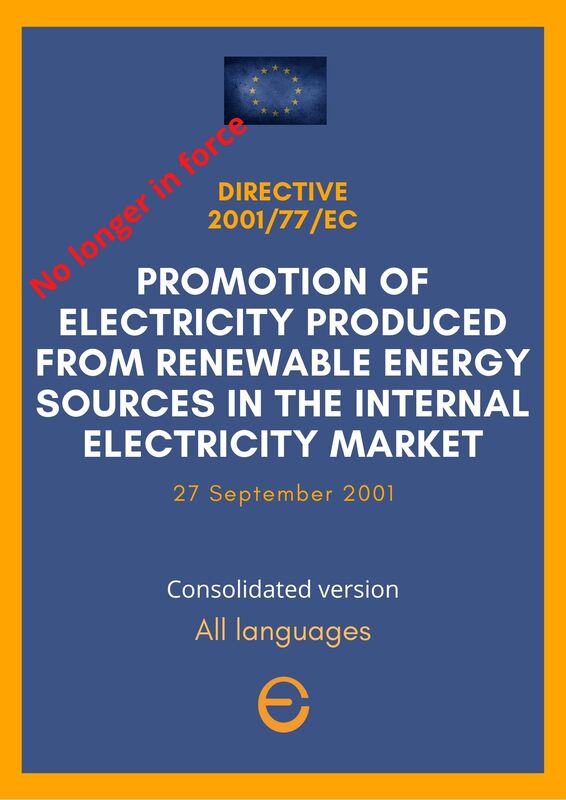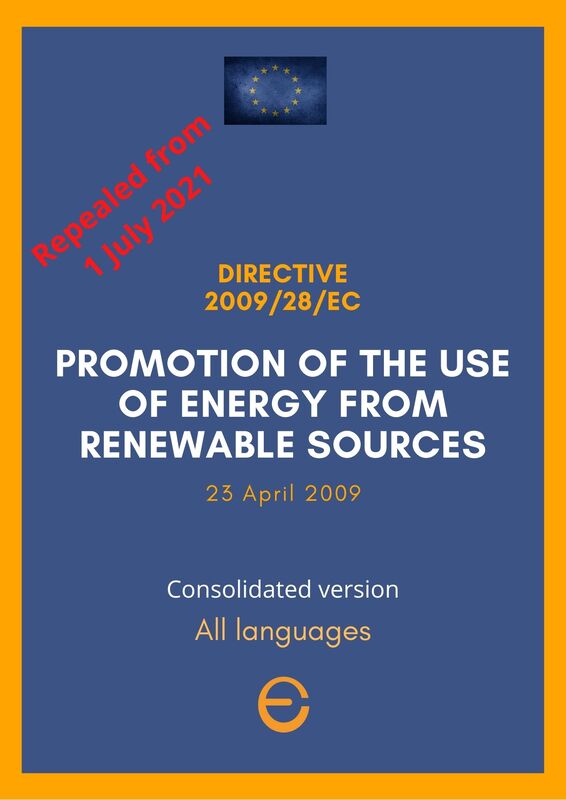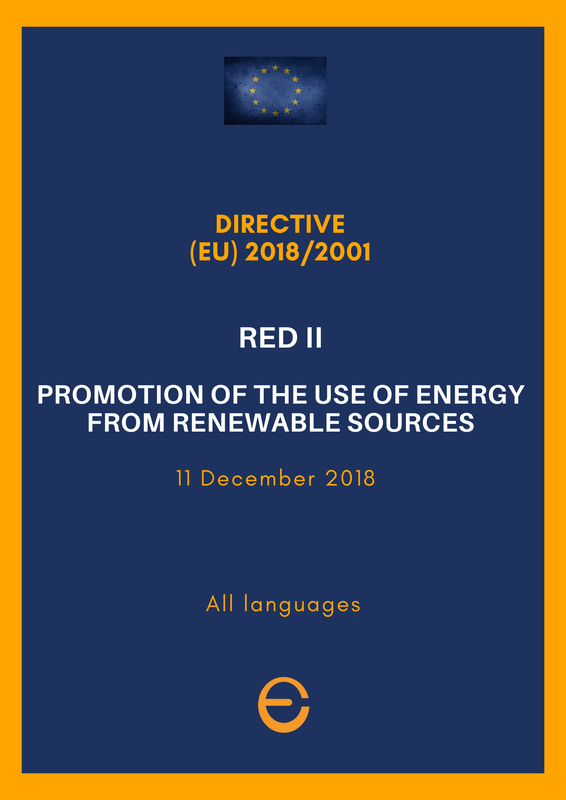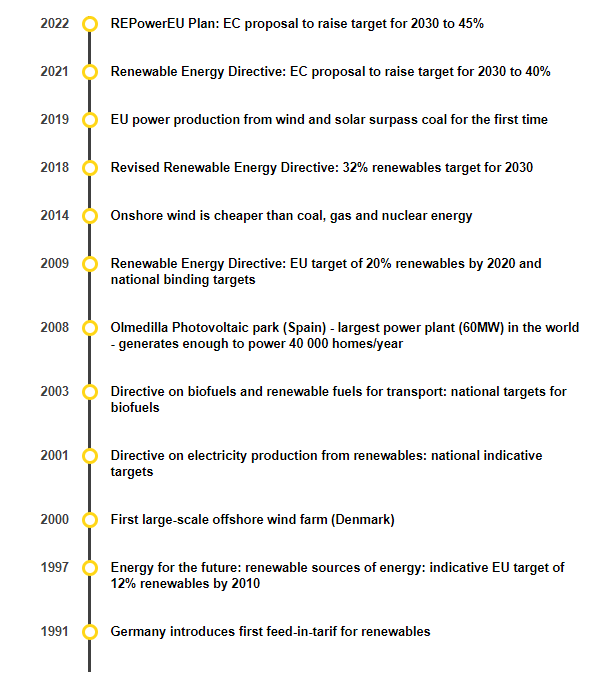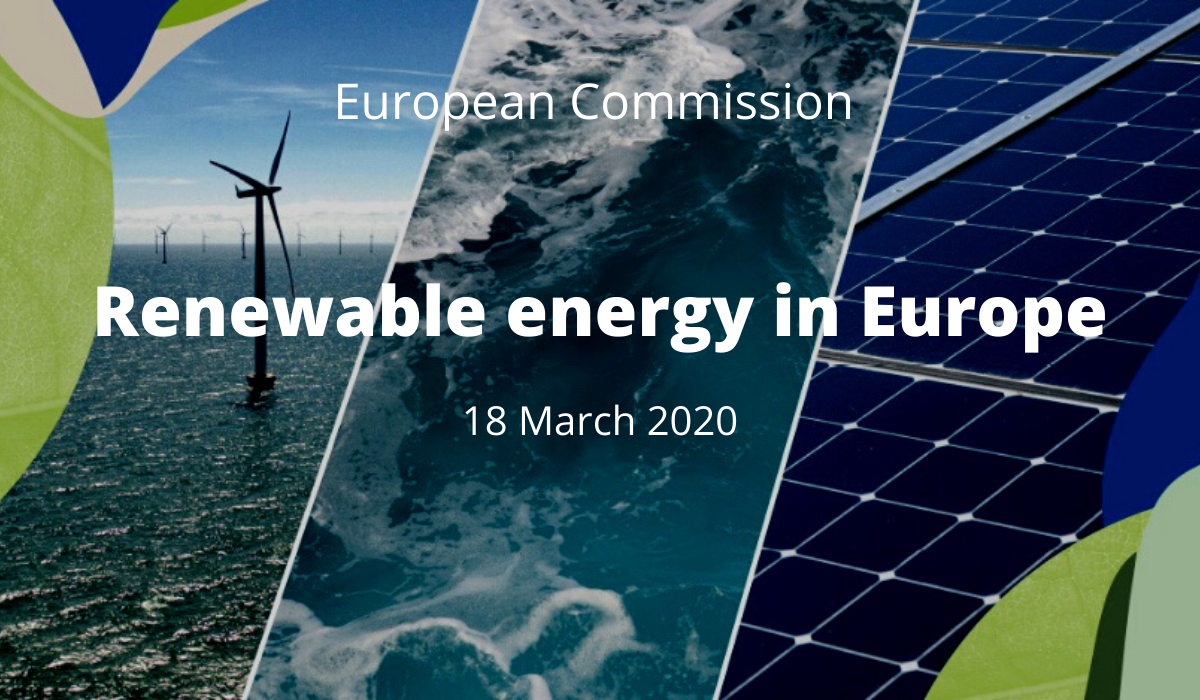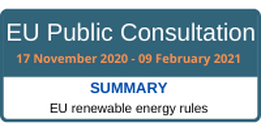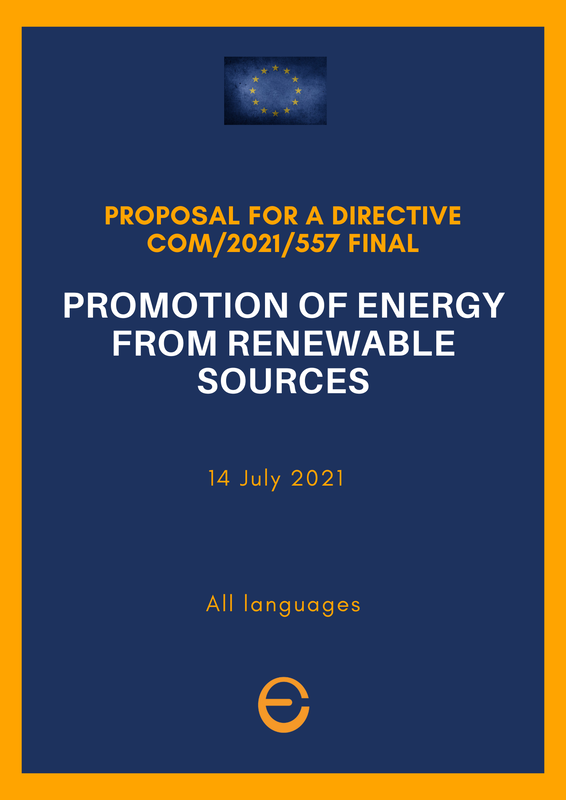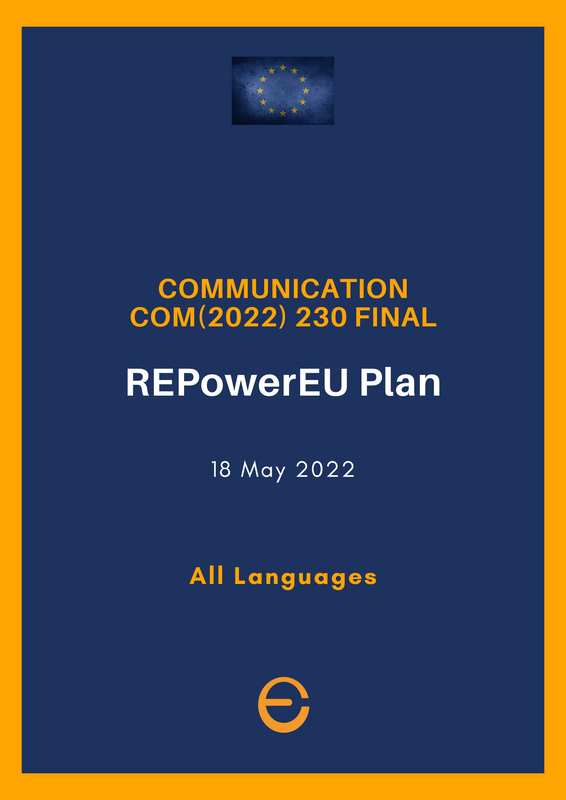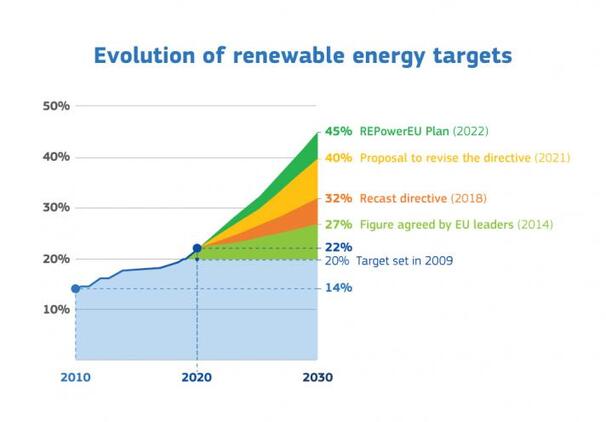|
Brussels, |
|
2009 - Target: 20% of renewables by 2030
|
Europe decided to increase the use of energy from renewable sources and it was adopted the Renewable Energy Directive 2009/28/EC establishing an overall policy for the production and promotion of energy from renewable sources. This Directive set the share of renewable energy at 20% of the total energy produced by 2020, to be achieved through the attainment of individual national targets. It was also decide that all EU countries must also ensure that at least 10% of their transport fuels come from renewable sources by 2020. |
2018 - Target: 32% of renewables by 2030
|
.
In 2018, EU released "RED II", the Renewable Energy Directive 2018/2001/EU, as part of the Clean energy for all Europeans package, aimed at keeping the EU a global leader in renewables and, more broadly, helping the EU to meet its emissions reduction commitments under the Paris Agreement. The directive sets a new binding renewable energy target for the EU for 2030 of at least 32%, with a clause for a possible upward revision by 2023, and includes measures for different sectors to achieve it. Among the new provisions:
EU countries are required to draw up National Energy and Climate Plans (NECP) for 2021 -2030, outlining how they will reach the new 2030 targets for renewable energy and energy efficiency. Most of the other elements of the new directive have to be transposed into national law by the Member States by 30 June 2021, when the original Renewable Energy Directive was repealed. The 2018/2001/EU Directive:
|
The 2018/2001/EU Directive includes:
- a binding EU overall target for 2030 of at least 32% of energy from renewable sources;
- rules for cost-effective and market-based financial support for electricity from renewable sources;
- protection of support schemes from modifications which put existing projects at risk;
- cooperation mechanisms between EU countries, and between EU countries and non-EU countries;
- simplification of administrative procedures for renewables projects (including one-stop-shops, time-limits, and digitalisation);
- an improved guarantee of origin system, extended to all renewables;
2018 Timeline for renewable energy in the EU
- rules allowing consumers to produce their own electricity, individually or as part of renewable energy communities, without undue restrictions;
- in the heating and cooling sector:
- an annual increase of 1.3 percentage points in the share of renewable energy in the sector
- the right for consumers to disconnect from inefficient district heating and cooling systems and
- third-party access for suppliers of renewables and waste heat and cooling to district heating and cooling networks;
- in the transport sector:
- a binding target of 14% with
- a specific sub-target for advanced biofuels of 3.5% and
- caps on conventional biofuels and on high indirect land use change risk* biofuels;
- strengthened EU sustainability criteria for bioenergy, by extending their scope to cover all fuels produced from biomass regardless of their final energy use.
2020 - Target: 40% of renewables by 2030
|
As said, with the European Green Deal, that is the European Strategic Climate Plan, the EU aims to become the first climate-neutral continent by 2050. To achieve this, the EU is committed to making existing legislation suitable for a reduction. emissions by 55% by 2030. It was therefore necessary to review the old legislation, so that renewable energy fully contributes to the achievement of the 2030 targets, in line with the 2030 Climate Target Plan, and to support the implementation of the vision outlined in the system integration strategies. energy and hydrogen, adopted on 8 July 2020. |
|
The EU wanted to build an integrated energy system suitable for climate neutrality and more recently introduced the use of hydrogen to contribute to these goals.
1. As a first step in the process of revising the Renewable Energy Directive, the Commission published a roadmap on 3 August 2020 and opened a seven-week period for public feedback on the concept. The feedback is then used in the Commission's further preparatory work for the revision of the directive. 2. The Commission launched a public consultation to review renewable energy rules on 17 November 2020, open for input until 9 February 2021, to gather input from stakeholders. In addition, a stakeholder meeting was organized on 11 December 2020 to collect first stakeholder input on the public consultation (Agenda). Here, the summary of the public consultation, published in March 2021 3. Then, the Commission decided a Proposal for a Directive COM/2021/557 final (RED III) in July 2021, as part of the package to deliver on the European Green Deal (read the document on the side) The proposal raised the ambition of the existing legislation to align it with EU’s increased climate ambition. It also seeks to introduce new measures to complement the already existing building blocks established by the 2009 and 2018 directives, to ensure that all potentials for the development of renewable energy are optimally exploited – which is the necessary condition to achieve the EU's objective of climate neutrality by 2050. |
In particular, the proposal included a new indicative Union target of renewables of 40%, and in buildings, 49% by 2030.
Later, the target was amended to 45% by the Commission with the support of the Parliament. However, with the adoption of Directive RED III, the target for renewables dropped to 42.5%.
Later, the target was amended to 45% by the Commission with the support of the Parliament. However, with the adoption of Directive RED III, the target for renewables dropped to 42.5%.
The targets and measures set in the revised directive aimed to reduce greenhouse gas emissions by at least 55% in 2030. This includes raising the overall renewables target (proposed to be increased to 40%), but also strengthened measures for transport or heating and cooling.
The proposed revision of the directive was also aiming at a more energy efficient and circular energy system that facilitates renewables-based electrification, and promotes the use of renewable and low-carbon fuels, including hydrogen, in sectors where electrification is not yet a feasible option, such as transport.
4. The proposed revision of the Directive has been voted by European Parliament as first reding on 14 Setember 2022 (read the text) and the Council held its latest discussion on 10 October 2022 (read the text). Few requests from the European Parliament have been accepted by the Council which, as usual, follows the Commission's proposals.
The European Parliament amended the proposal to raise the target to 45% renewables by 2030, as suggested by the Commission with the REPowerEU Plan on 18 May 2022.
An agreement was reached on March 30, 2023, between the European Parliament and the Council. This deal aimed to bring the EU one step closer to completing the "Fit for 55" legislation to achieve the objectives of the European Green Deal and REPowerEU.
The agreement raises the EU's binding renewable target for 2030 to a minimum of 42.5%, up from the current 32% target, nearly doubling the existing share of renewable energy in the EU. Negotiators also agreed that the EU would strive to achieve a 45% share of renewables by 2030.
This provisional agreement was confirmed by the two legislators in Summer 2023.
The proposed revision of the directive was also aiming at a more energy efficient and circular energy system that facilitates renewables-based electrification, and promotes the use of renewable and low-carbon fuels, including hydrogen, in sectors where electrification is not yet a feasible option, such as transport.
4. The proposed revision of the Directive has been voted by European Parliament as first reding on 14 Setember 2022 (read the text) and the Council held its latest discussion on 10 October 2022 (read the text). Few requests from the European Parliament have been accepted by the Council which, as usual, follows the Commission's proposals.
The European Parliament amended the proposal to raise the target to 45% renewables by 2030, as suggested by the Commission with the REPowerEU Plan on 18 May 2022.
An agreement was reached on March 30, 2023, between the European Parliament and the Council. This deal aimed to bring the EU one step closer to completing the "Fit for 55" legislation to achieve the objectives of the European Green Deal and REPowerEU.
The agreement raises the EU's binding renewable target for 2030 to a minimum of 42.5%, up from the current 32% target, nearly doubling the existing share of renewable energy in the EU. Negotiators also agreed that the EU would strive to achieve a 45% share of renewables by 2030.
This provisional agreement was confirmed by the two legislators in Summer 2023.
2022 - Target: 45% of renewables by 2030
|
On 18 May 2022 the European Commission presented the REPowerEU Plan, already announced in March. This plan overlaps with the RED III Directive Proposal described earlier, precisely during its legislative process. The amendments introduced will become part of the discussion among European legislators, as described in the previous paragraph and with the outcome described in the following paragraph.
This plan was a sort of response to the increasing energy problems facing Europe. The need to give more courage to the ambitions already expressed for 2030 and 2050 in the energy field and that the war in Ukraine has made more urgent. The Commission underlined a double urgency to transform Europe's energy system:
The European Commission thinks that "by acting as a Union, Europe can phase out the dependency on Russian fossil fuels faster" through:
|
For this reason, the Commission proposed a new target of 45% by 2030 of renewables and this proposal amended the Proposal for a Directive COM(2021) 557, the so-called RED III.
The new Directive was endorsed by the EU legislative authorities in Summer 2023. Read the analysis of the Directive here.
Go to REPowerEU Plan
The new Directive was endorsed by the EU legislative authorities in Summer 2023. Read the analysis of the Directive here.
Go to REPowerEU Plan
2023 - Directive RED III - Target: 42.5% of renewables by 2030
The new European directive RED III is adopted by European legislators and sets the new target for final energy consumed at least at 42.5%, and not an obligation to reach 45% as suggested by the Commission and supported by European Parliament.
Key points of the Directive RED III
1. Increasing the binding renewable target for 2030 to at least 42.5%, with an aim of reaching 45% renewables.
2. Prioritizing renewable energy as an overriding public interest while maintaining environmental protection standards.
3. Streamlining permitting procedures for renewable projects and creating acceleration areas with simplified processes in regions with high renewables potential and low environmental risks.
4. Enhancing cross-border cooperation on renewables.
5. Strengthening annual renewables targets for heating, cooling, and district heating systems.
6. Introducing a 49% renewable energy benchmark for energy consumption in buildings by 2030.
7. Incorporating industry in the Renewable Energy Directive for the first time with indicative targets and a binding target for renewable hydrogen.
8. Enforcing regulatory framework for renewable energy use in transport and promoting advanced biofuels and renewable fuels of non-biological origin.
9. Focusing on energy system integration through electrification and waste heat utilization.
10. Expanding guarantees of origin to provide better consumer information.
11. Strengthening bioenergy sustainability criteria, including lower thresholds for installations and promoting the highest economic and environmental value use of woody biomass.
2023: New rules on renewable Hydrogen
On 13 February 2023, the Commission has proposed detailed rules to define what constitutes renewable hydrogen in the EU, with the adoption of two Delegated Acts required under the Renewable Energy Directive.
These Acts are part of a broad EU regulatory framework for hydrogen which includes energy infrastructure investments and state aid rules and legislative targets for renewable hydrogen for the industry and transport sectors.
The two acts are still under discussion in the European Parliament and they will ensure that all renewable fuels of non-biological origin (also known as RFNBOs) are produced from renewable electricity. The two Acts are inter-related and both necessary for the fuels to be counted towards Member States' renewable energy target.
They will provide regulatory certainty to investors as the EU aims to reach 10 million tonnes of domestic renewable hydrogen production and 10 million tonnes of imported renewable hydrogen in line with the REPowerEU Plan.
These Acts are part of a broad EU regulatory framework for hydrogen which includes energy infrastructure investments and state aid rules and legislative targets for renewable hydrogen for the industry and transport sectors.
- The first Delegated Act defines under which conditions hydrogen, hydrogen-based fuels or other energy carriers can be considered as an RFNBO. The Act clarifies the principle of “additionality” for hydrogen set out in the EU's Renewable Energy Directive. Electrolysers to produce hydrogen will have to be connected to new renewable electricity production. This principle aims to ensure that the generation of renewable hydrogen incentivises an increase in the volume of renewable energy available to the grid compared to what exists already. In this way, hydrogen production will be supporting decarbonisation and complementing electrification efforts, while avoiding pressure on power generation.
- The second Delegated Act provides a methodology for calculating life-cycle greenhouse gas emissions for RFNBOs. The methodology takes into account greenhouse gas emissions across the full lifecycle of the fuels, including upstream emissions, emissions associated with taking electricity from the grid, from processing, and those associated with transporting these fuels to the end-consumer. The methodology also clarifies how to calculate the greenhouse gas emissions of renewable hydrogen or its derivatives in case it is co-produced in a facility that produces fossil-based fuels.
The two acts are still under discussion in the European Parliament and they will ensure that all renewable fuels of non-biological origin (also known as RFNBOs) are produced from renewable electricity. The two Acts are inter-related and both necessary for the fuels to be counted towards Member States' renewable energy target.
They will provide regulatory certainty to investors as the EU aims to reach 10 million tonnes of domestic renewable hydrogen production and 10 million tonnes of imported renewable hydrogen in line with the REPowerEU Plan.
2023: Wind Power Action Plan
On 24 October 2023, the European Commission released the European Wind Power Action Plan, as part of the EU Wind Power Package. This is a strategic initiative aimed at significantly boosting wind energy deployment and manufacturing in Europe. The plan is based on six key pillars, focusing on a range of actions to be urgently undertaken by both public and private sectors to accelerate the growth of wind energy across the continent. Here's a detailed overview:
- Fast-Tracking of Permitting: Streamline permitting processes for quicker wind energy project deployment.
- Improving Auction Systems: Refine auction systems for efficient resource allocation and wind energy expansion.
- Skills Development: Enhance training and skills in the wind energy sector to meet industry demands.
- Access to Finance: Improve financial access for easier funding and investment in wind energy projects.
- Stable Supply Chains: Develop strategies for stable supply chains to support consistent growth in wind energy.
- Industrial Competitiveness: Balance renewable energy transition with industrial competitiveness and economic growth.
Source: European Union, http://www.europa.eu/, 1998-2024
|
Brussels - Milano - Nice - Tokyo
|
eEuropa Belgium
Avenue Louise, 367 1050 Brussels BELGIUM Bld. Franck Pilatte, 19 bis
06300 Nice FRANCE YONO HOUSE 9-1 KAMIOCHIAI, SAITAMA-SHI, SAITAMA-KEN 〒 338-0001 JAPAN Via S. Veniero 6 20148 Milano ITALY |
All rights reserved - © Copyright eEuropa Belgium 2020-2024

